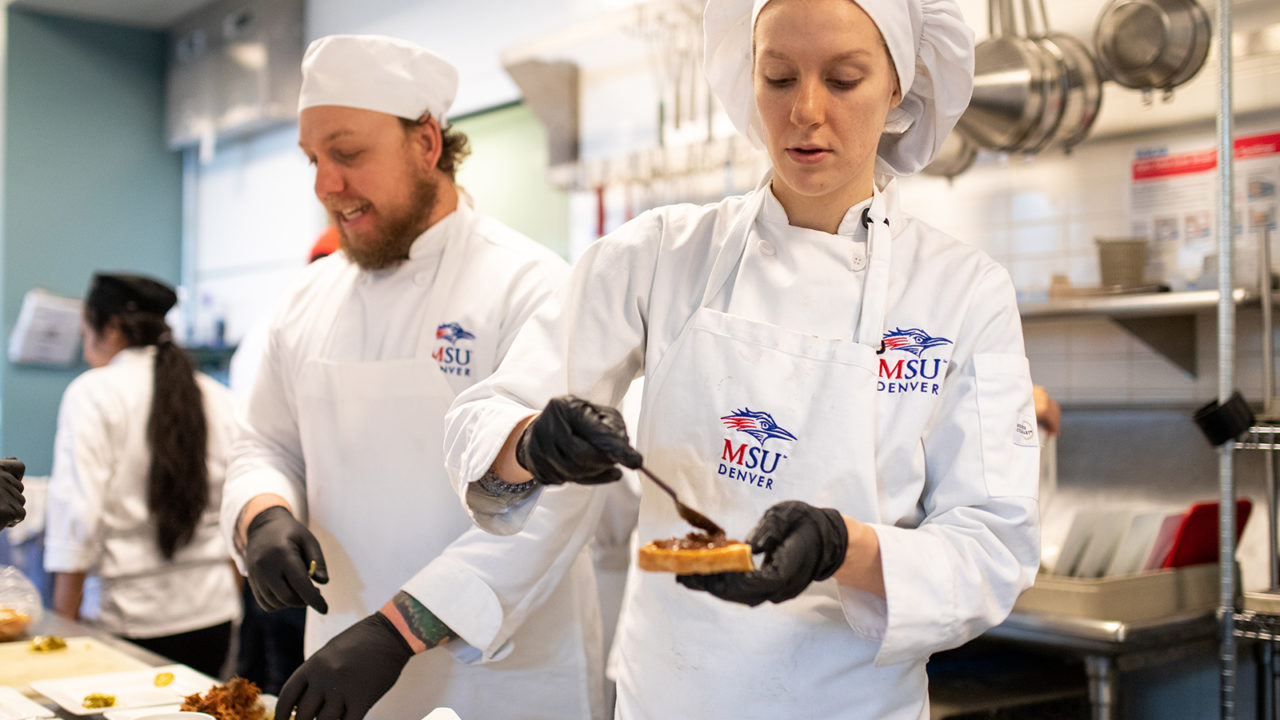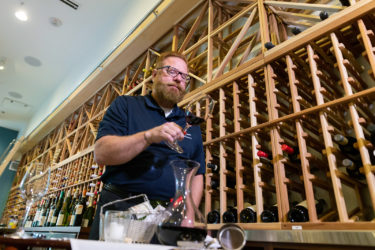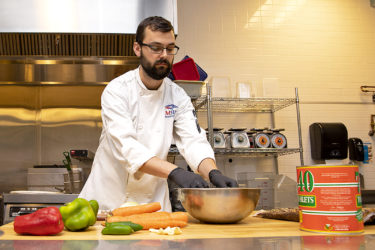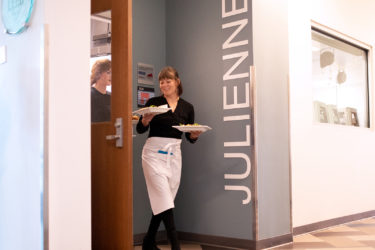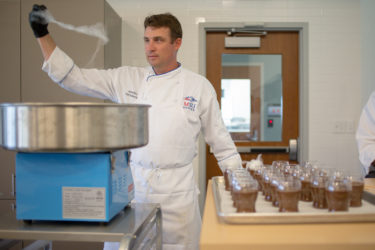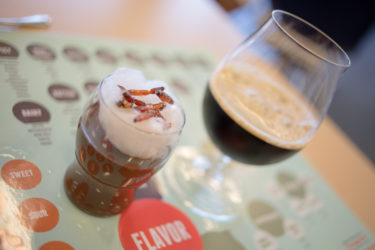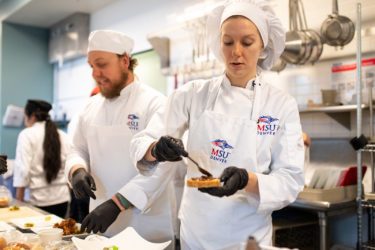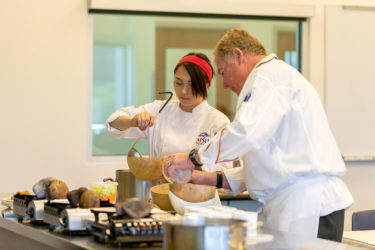Feeder School
Metropolitan State University of Denver is educating the next generation of leaders in Colorado’s booming hospitality industry.
Colorado in 2018 continued a nine-year streak of record-setting growth in visitors and traveler spending, according to new studies commissioned by the Colorado Tourism Office.
A record 85.2 million people visited the Centennial State in 2018, according to a report by Longwoods International. Meanwhile, total direct travel spending in the state during 2018 was more than $22.3 billion and supported more than 174,000 jobs, a report by Dean Runyan Associates found.
All those visitors – combined with the state’s hungry residents – support approximately 11,800 eating and drinking locations, more than 75% of which are independently owned and operated, according to 2019 data from the Colorado Restaurant Association. The state’s food-service industry employs 285,000 workers, almost 10% of the state labor force.
Metropolitan State University of Denver’s School of Hospitality isn’t just graduating the talent needed to fill those jobs; it’s driving growth and innovation in this critical economic sector through its new Gina and Frank Day Leadership Academy, innovative public-private partnerships and vanguard degree programs.
“The hospitality industry is a critical part of Colorado’s economy, and the School of Hospitality’s innovative and relevant degree programs are preparing students for dynamic careers not only in our state but also opening doors for career pathways in the global hospitality industry,” said Christian Hardigree, J.D., dean of the school.
Leadership in service
Chances are good you’ve dined with Frank Day.
He built a hot dog stand into Concept Restaurants Inc., a national company that integrates hospitality and food. Among its Colorado food-and-beverage stalwarts are Denver’s Humboldt Farm Fish Wine, Ignite Kitchen + Cocktails and Stout Street Social, and Boulder’s Spruce Farm & Fish, License No. 1 and The Corner Bar.
“Colorado’s hospitality industry has been formed by Day’s leadership,” said Hardigree.
But Day didn’t just build an empire, she said. He changed countless lives by nurturing the next generation of hospitality leaders.
“(Day) demonstrated how as an owner and operator you care about the whole person’s development,” Hardigree said. “It’s not just about hiring someone and when they leave getting somebody else in. It’s really about mentoring them and taking them to the next level in their careers.”
Now, a generous gift by Gina and Frank Day to MSU Denver will infuse everything in the School of Hospitality with that brand of leadership, Hardigree said. It will establish the Day Leadership Endowment and the Gina and Frank Day Leadership Academy, which will create a 360-degree mentoring program incorporating leaders from Concept Restaurants, Sage Hospitality and Stonebridge Companies; and launch an Industry Professional Hospitality Online Leadership Certificate.
“People learn how to be effective leaders through the experience they gain from years on the job,” Frank Day said. “My goal is to give students a shortcut to that information by teaching them the mechanics of leadership while they are still in school, with the hope they will be better-equipped when they go into the field after graduation.”
Students who learn those lessons are better-prepared to create a positive environment where people can develop, grow and work together as a team, he said.
“The way to achieve your goal is to make it the goal of others,” Day said. “Leadership is the key to success.”

Be our guest
All those visitors to Colorado need a place to bed down, and in 2018 overnight stays in commercial lodgings accounted for about 67% of the $22.3 billion in direct travel spending in the state, according to the report commissioned by the Colorado Tourism Office.
Preparing MSU Denver School of Hospitality students to fill the jobs that visitor spending creates requires more than a bachelor’s degree – it also requires experience at top hotels.
Enter Stonebridge Companies, the privately owned, Denver-based hotel operator and developer. It was started by Navin Dimond in 1991; today, it manages a portfolio of 62 hotels nationwide and provides investor opportunities, hotel-development services, hotel-management services and hospitality-career opportunities.
In 2014, a generous gift made by the Dimond family established the Rita and Navin Dimond Fellows Program, which allows recipients to gain paid, hands-on experience at select Stonebridge Companies properties across metro Denver. The program accepts students twice a year, selecting from applicants who have completed a minimum of 60 credits toward any School of Hospitality degree program.
The Dimonds decided to make the donation and create the fellows program because the University serves first-generation college students who look a lot like Navin Dimond did before he founded Stonebridge Companies.
This fall, 56% of MSU Denver’s student body are first-generation college students.
“We can play more of a role than giving money,” Dimond said. “We can provide a deeper experience for the students through paid internships and potential future employment opportunities.”
The fellowship has been transformative, providing invaluable industry experience with Stonebridge Companies for nearly 40 Roadrunners, including U.S. Army veteran David Keller.

Keller was living in Fairbanks, Alaska, and struggling to make ends meet as a kitchen manager when he decided to take advantage of his U.S. Department of Veterans Affairs tuition benefits at MSU Denver’s School of Hospitality. The event and meeting management major was a fall 2018 awardee of the fellowship, working at Stonebridge Companies’ DoubleTree by Hilton – Denver Tech Center.
The fellowship helped him become a better event planner, the December 2018 graduate said.
“Planners need to understand nothing ever goes right but that keeping yourself under control makes everyone around you feel secure and able to take control of the situation themselves,” he said. “That’s turning chaos into order.”
Keller also acknowledged the University’s overall commitment to military veterans.
“Other institutions have services for veterans, but it’s more mechanical: You step inside, get the resource, and you’re done,” he said. “Here, it’s very inviting – it has created this environment where all of the other vets want to volunteer to help out.
“You can tell MSU Denver really cares about veteran students.”
Brewing success
Other veterans enrolled at MSU Denver are finding their second career through the School of Hospitality’s Beer Industry Program.
Alumnus Chris Thibodeau served 23 years in the Air Force. Stressed out and suffering from hypertension after years of military service, he enrolled at MSU Denver and majored in brewing operations. His education didn’t just open new career pathways; it improved his health.
“Brewing is such a relaxing atmosphere,” he said. “It’s low-stress, plus I’m doing something I truly love. And my blood pressure is normal, which it hadn’t been in over 20 years.
“My wife and I like to say that getting into beer saved my life.”
Colorado’s craft-beer industry pours nearly $3.16 billion into the state’s economy, according to the Brewers Association, a national nonprofit trade group comprising more than 5,000 U.S. breweries. And though there are 396 craft breweries in Colorado and more than 6,700 breweries nationwide, the market isn’t saturated, said Scott Kerkmans, director of MSU Denver’s Beer Industry Program – it’s hopping.

The program provides students with the comprehensive tools they need to navigate the modern beer-brewing landscape at any level or in any state, he said.
“Our curriculum is unlike anything in beer education, and it’s one of the things we’re proudest of,” Kerkmans said. “What we do better than the vast majority of schools is prepare students with the tangible skills that allow them to add value to an employer the first week they’re on the job.”
The program is different by design: It’s based in hospitality – instead of, say, chemistry – and the focus is on the broad array of careers in the industry while still offering a 4-year diploma in beer that’s certified by the Master Brewers Association of America.
It also separates itself from the pack through its unique industry partners, such as the Tivoli Brewing Co.: Students get access to hands-on learning in Tivoli’s on-campus 30-barrel brewhouse, while the brewery gets a pipeline for potential employees.
Thanks to a donation by Cask Global Canning Solutions, the program is also at the forefront of the beer industry’s recent shift to cans.
Bottles made up 84% of craft-beer packaging in 2014, while cans comprised just 16%, according to the Brewers Association. Last year, brewers packaged 40% of their beer in cans, and the trend shows no signs of slowing.
The Tivoli Brewing Co. recently fired up a Cask microcanning system donated by the company’s founder and CEO, Peter Love, with the help of MSU Denver brewing students.
The cans of Tivoli Roadrunner Red rolling off the line are just another example of MSU Denver’s leadership in the beer industry, Kerkmans said.
“We’re able to give our students real-world experience,” he said, “while working with such great partners.”


